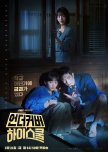This review may contain spoilers
Good to watch
This narrative presents a watchable experience centered on a group of school students, largely due to the commendable performances of its actors. The cast, particularly the main leads, deliver compelling portrayals that encourage continued viewing. While the fundamental storyline may adhere to conventional series structures, the production distinguishes itself through its straightforward and uncomplicated execution.
A notable aspect of the series is its handling of conflict. Although negative characters are introduced, they are depicted without excessive malice or toxicity. These antagonists tend to have fleeting roles and are often resolved with relative ease by the protagonists. The manner in which the main characters address these challenges is particularly noteworthy, as it avoids generating a sense of negativity or prolonged dramatic tension. This approach contributes to a viewing experience that remains largely positive and avoids unnecessary narrative complexities.
However, the narrative does exhibit some shortcomings, particularly concerning the clarity of its conclusion. The ending lacks a definitive resolution, leaving certain plot threads unresolved. This is especially evident in the ambiguous handling of the protagonist's physical ailment. The series fails to provide a clear explanation or outcome regarding this aspect of the character's journey, which can leave the audience with a sense of incompleteness.
Despite this lack of narrative closure, the series benefits from its concise character development and the absence of superfluous scenes or convoluted subplots. The focus remains on the core interactions and experiences of the student group, ensuring a streamlined and engaging viewing experience for the majority of its duration. While the ambiguity surrounding the protagonist's physical condition and the overall ending may detract from a fully satisfying conclusion, the series' strengths in character performance and uncomplicated storytelling contribute to its watchability.
A notable aspect of the series is its handling of conflict. Although negative characters are introduced, they are depicted without excessive malice or toxicity. These antagonists tend to have fleeting roles and are often resolved with relative ease by the protagonists. The manner in which the main characters address these challenges is particularly noteworthy, as it avoids generating a sense of negativity or prolonged dramatic tension. This approach contributes to a viewing experience that remains largely positive and avoids unnecessary narrative complexities.
However, the narrative does exhibit some shortcomings, particularly concerning the clarity of its conclusion. The ending lacks a definitive resolution, leaving certain plot threads unresolved. This is especially evident in the ambiguous handling of the protagonist's physical ailment. The series fails to provide a clear explanation or outcome regarding this aspect of the character's journey, which can leave the audience with a sense of incompleteness.
Despite this lack of narrative closure, the series benefits from its concise character development and the absence of superfluous scenes or convoluted subplots. The focus remains on the core interactions and experiences of the student group, ensuring a streamlined and engaging viewing experience for the majority of its duration. While the ambiguity surrounding the protagonist's physical condition and the overall ending may detract from a fully satisfying conclusion, the series' strengths in character performance and uncomplicated storytelling contribute to its watchability.
Was this review helpful to you?



